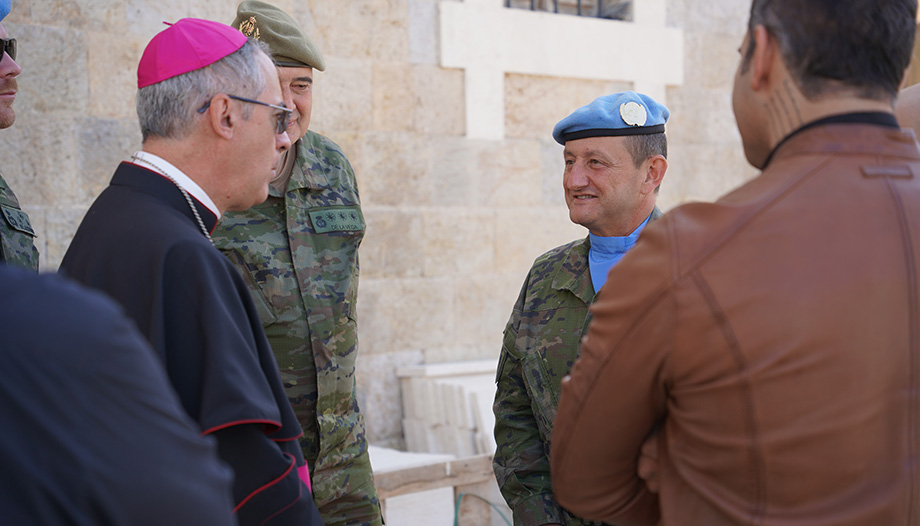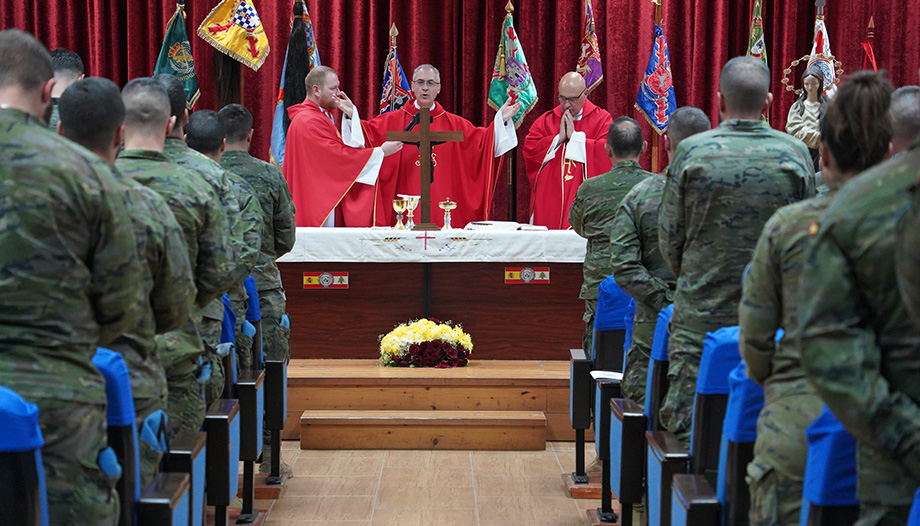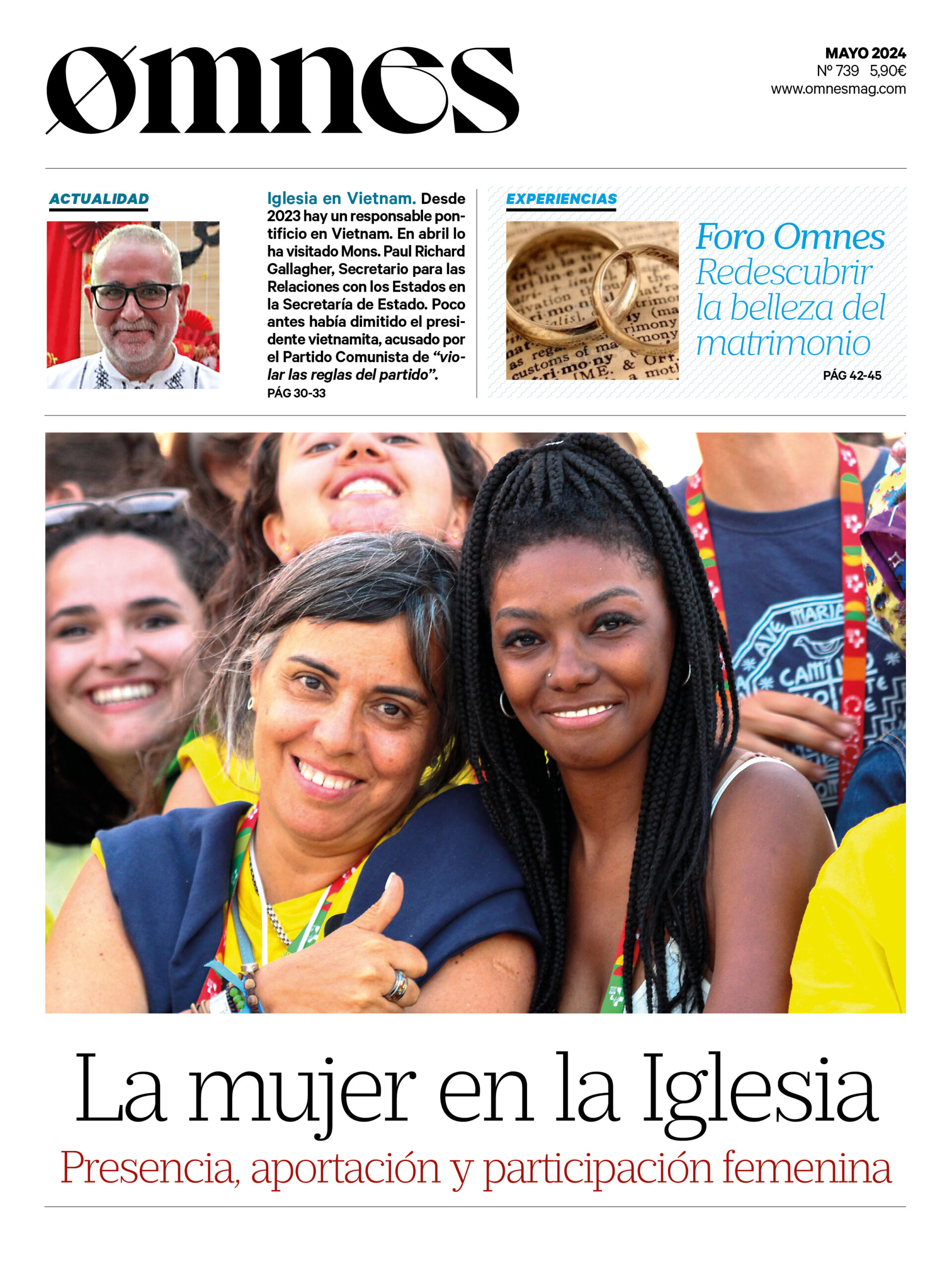November 2023 will mark two years since Pope Francis appointed Juan Antonio Aznárez Cobo as Archbishop of the Military Archdiocese of Spain. The 61-year-old Eibar native had been auxiliary bishop of Pamplona and Tudela for nine years. His relationship with the military world had been reduced, until then, to his experience in the Compulsory Military Service and to certain celebrations.
He arrived at the military archbishopric in the midst of the pandemic and after the unexpected death of his predecessor, Bishop Juan del Río, due to the coronavirus. In these two years he has been able to know and love the military world, the pastoral work of few but dedicated priests and above all "the example of the Catholic lay men and women in their units and among their colleagues".
It will be two years since you arrived at the Military Archbishopric, how have you experienced it?
-The main objective when you arrive in a diocese, in any diocese, is to get to know the priests, the team of vicars, etc. In my case, it is also to visit the different units, academies, training centers for the troops, and so on.
The clergy is not very numerous in the Spanish military archbishopric, there are 82 priests (with me 83). There are also some retired priests who collaborate in pastoral work or priests who, without really belonging to the military archbishopric, lend a hand and help us.
I have been able to get to know the priests also thanks to the meetings that we hold annually in Malaga for the military clergy. My first steps have been the same as when you arrive at a parish: listen and see. All this to get an overall idea of how things are, the needs of the people and to know the ways of doing the work.
What did you find?
-A peculiar diocese, a precious pastoral work. Everything can be improved, starting with oneself (laugh). But it is a very nice reality that serves the personnel working in the different corps of the Army, Navy, Civil Guard and National Police. We do it with the corresponding limitations because we have the clergy we have.
Personally, I have felt welcomed, both by the clergy and by the commanders and the soldiers and policemen with whom I have come into contact. They are very grateful, hardworking, very respectful and, in many cases, believers.
We have a large demand for the sacraments of Christian Initiationespecially for the sacrament of Confirmation, but also a still small but growing number of baptisms, etc.
Men and women who are not baptized and want to enter the Church, attracted by the example of companions, relatives or because, in the case of the baptized and not confirmed, what they had sown in their hearts bears fruit, and they see the convenience of being strengthened by the sacrament of Confirmation.
There is a lot of work to do. In general, they work very well, I see dedicated priests. But not only them, the example and the work of the Catholics who live in these environments is very important. From the boy or girl who enters a Troop Training Center to the JEMAD.
Some say that, in a non-denominational state, the military archbishopric is a figure "of the past".
-Not at all. The peculiarity of the lives of these people is what justifies the existence of the Military Archbishopric. We are talking about people who, in many cases, have a great mobility. And a peculiarity of life, of service, of all that military life entails. A clear example is the peace missions abroad.
These people have every right to be accompanied and assisted spiritually. We are there to serve and, today, most of them appreciate and value this service of the Church.


The military archbishopric is present in some territorial dioceses. How is the relationship with the diocesan bishops?
-Very good! Full communion and full collaboration. It is a fraternal relationship, in the case of the bishops and myself. One of the characteristics of our diocesans is that they enjoy a double jurisdiction: they can avail themselves of the military jurisdiction or the jurisdiction of the diocese in which they are, so, for them, it is all advantages!
To give an example, on the feast of the Pilar, patroness of the Civil Guard, there are hundreds of celebrations and the diocesan bishop usually goes to the different places. The mission is the same for everyone: to bring Christ to the people.
In the case of priests it is similar. The military chaplains, when they are stationed in various places, present themselves to the corresponding diocesan bishop and place themselves, also, at his service. In fact, on more than a few occasions they carry out the strictly military mission and, if they can lend a hand, they do so. Moreover, they cultivate their contacts with other priests in the area to avoid the danger of isolation because, being so spread out, there are not many of them and the distances are great, this can happen.
Several young men are being trained for the priesthood at the Military Seminary. How do you see this seminary?
-It is small but alive. Obviously, I say what any bishop would say: "We want more vocations and we ask the Lord for them".
It must be kept in mind that there are two ways of access to the military archbishopric; at the present time, the military seminary would not be sufficient to provide for all the needs. In addition to the priests who are ordained within the military ordinariate, there are also those priests who feel called by the Lord to serve in this field and, once they have spoken with their bishop and with the permission of their ordinary, they enter temporarily. It is a service within the military archbishopric for 8 years, renewable. They are not incardinated in the Military Archbishopric of Spain, they continue to depend on the bishop of their diocese.
"Our diocesans have a double jurisdiction: they can avail themselves of the military jurisdiction or the jurisdiction of the diocese in which they are located, so, for them, it's all advantages!"
Bishop Juan Antonio AznarezMilitary Archbishop of Spain
We have talked about the work "on land", but another chapter is the missions or moments of great separation such as the voyages of a training ship. In these circumstances, what is the mission of the "pater"?
-On land, or away from home, the mission of chaplains is to be pastor and father. There are differences between the missions themselves. Some are more risky, you are far from your family..., sometimes there is a real risk of being wounded or even losing your life, in an accident or an attack. All of this is a reality check. Big questions - and doubts - arise when faced with the reality that tomorrow you may not be able to return. This often helps to rethink life, and to meet the Lord.
The fact that there is a person you trust, who will not tell you anything, to whom you can go to unburden yourself, the possibility of having recourse to the sacrament of Confession, the Eucharist..., everything is of great value to these people.
Many times, in addition, chaplains act as a "bridge" between the commanders and the soldiers, helping to solve personal or group problems or difficulties. This, for example, is very much appreciated by the commanders. In these cases, it is always very important that the chaplain is available.
What challenges do you see for the future of the Military Archbishopric?
-The priority is personal conversion. This is always the case. And after that, processes: Evangelization. The Christian does not come from Mars or poppies. It requires care and dedication: taking care of families, marriages....
It is very important to be committed to formation, even more so at this time when we often have a superficial faith. We need Christians with roots, rooted in Christ.
Therefore, I believe that this synodal process is important. What is synodality? Synodality is the Church, -the eckklesia-those called by the Lord. It is important to overcome the idea of an intimate Catholicism - only God and me. Of course, it must be God and me, but God and me with our brothers and sisters. We have each other's backs, as St. Teresa of Jesus used to say.













